
The death of longtime Justice Ruth Bader Ginsburg (shown) on the eve of what was already one of the most contentious presidential elections ever has created a highly volatile political situation in the United States.
The other shoe has finally dropped with the death of Supreme Court Associate Justice Ruth Bader Gingsburg on Friday evening, following complications from pancreatic cancer. The death of Ginsburg comes just a little more than six weeks before an already highly contentious presidential election between Republican President Donald Trump and his Democratic challenger, former Vice President Joe Biden.
Ginsburg’s passing has been expected, but its timing raises several issues that will overshadow the life of a very significant member of the court. Ironically, Trump had just concluded a campaign speech, which concentrated on the importance of his re-election in regards to the next nominee on the Supreme Court, with him promising to name conservative justices should he be given the opportunity to do so.
Following the speech, reporters asked him for a response to the news of Ginsburg’s death. Trump appeared shaken, and asked, “She just died? Wow. I didn’t know that. I just … you’re telling me now for the first time.” After a moment, Trump said, “She led an amazing life. What else can you say? She was an amazing woman, whether you agree [with her] or not. She was an amazing woman who led an amazing life. I’m actually sad to hear that. Thank you very much.”
Trump declined to respond to questions as to whether he intends to nominate a replacement before the election, and walked away.
There are actually several questions to be answered over the next few days, including the question of whether Trump will attempt to fill the vacancy before the November 3 election. Other questions, which are all intertwined, include who Trump will nominate, and what the Senate would do if Trump did send a name to them for confirmation before the election. Finally, there is the question as to what impact the death of Ginsburg will have on the outcome of the election — which will determine if Trump remains president to fill future vacancies next year.
Interestingly, Trump floated a name during his speech, that of Senator Ted Cruz of Texas. “I’m putting Ted Cruz as one of the people for the Supreme Court,” Trump said. “Ted’s the only man I know who could get 100 votes from the Senate. Every single senator is going to vote for him. He’s a great guy, a brilliant guy.”
Certainly, indications are that he would be a constitutionalist, were he nominated and confirmed to the Supreme Court. No one questions his brilliance, including his professor in law school, Alan Dershowitz — a liberal Democrat — who has said that Cruz was perhaps the most brilliant student he ever had in class.
Perhaps an example of that “brilliance” was a point that Cruz made on Fox News’ program with Sean Hannity Friday night, following the news of Ginsburg’s passing. Cruz noted that her death had created a 4-4 court, and with Hillary Clinton and other Democrats urging Biden not to concede the election under any circumstances, there are likely going to be some court cases that will need to be decided in its aftermath. A 4-4 court, Cruz told Sean Hannity, could create constitutional chaos. Cruz was in the legal team 20 years ago following the dispute in Florida, that led to the Bush v. Gore decision by the Supreme Court.
Despite Trump’s optimism, however, it is doubtful that Cruz or any other person that Trump nominated before the presidential election could get the votes of every single member of the Senate, simply because the Democrats will vote as a bloc against any name that Trump would send forth for consideration. In addition to expected unanimous Democrat opposition, there are four Republican senators who could oppose naming anyone until after the election — Senator Mitt Romney of Utah, who was the lone Republican to vote in favor of removing Trump from office in the impeachment trial earlier this year; Alaska Senator Lisa Murkowski, who voted against the confirmation of Justice Brett Kavanaugh; Maine Senator Susan Collins, who voted for Kavanaugh, but is facing a difficult re-election battle because of that vote; and Senator Ben Sasse of Nebraska, who ordinarily votes for confirmation of judicial nominees, but seems to have some personal animus against Trump.
In addition to Cruz, speculation has also centered on Judge Amy Comey Barrett of the 7th Circuit Court of Appeals, and Judge Joan Larsen of the 6th Circuit. Barrett has long been a favorite of conservatives. Her devout faith — she is a Roman Catholic and a graduate of Notre Dame — was openly criticized by liberals during her 2017 confirmation hearings to the circuit court. What would no doubt provide the most opposition to her confirmation from the Left would be her stated opinion that precedent is not sacrosanct, causing the pro-abortion lobby concern that she would vote to overturn the pro-abortion Roe v. Wade decision of 1973. Larsen clerked for the late Justice Antonin Scalia, who was greatly admired on the Right.
Trump would be the first president since Franklin Roosevelt in 1940 to name a Supreme Court nominee during his re-election. Democrats will no doubt raise the decision of Senate Majority Leader Mitch McConnell in 2016 to not even hold hearings for President Barack Obama’s nomination of Merrick Garland, as Biden indirectly did on Friday night, arguing that the people should vote for president first. But McConnell explained that “in the last midterm election before Justice Scalia’s death in 2016, Americans elected a Republican Senate majority because we pledged to check and balance the last days of a lame-duck president’s second term. We kept our promise. Since the 1880s, no Senate has confirmed an opposite-party president’s Supreme Court nominee in a presidential election year.”
McConnell added, “Americans reelected our majority in 2016 and expanded it in 2018 because we pledged to work with President Trump and support his agenda, particularly his outstanding appointments to the federal judiciary. Once again, we will keep our promise. President Trump’s nominee will receive a vote on the floor of the United States Senate.”
While initial political focus has been on Republican Collins in Maine, and the effect of her voting on any Trump nominee at this time, it should also be noted that Democrats running for re-election to the Senate in November could likewise face electoral consequences were any of them to vote against any nominee. A prime example would be Senator Doug Jones of Alabama, who is already on the politically endangered list.
Photo of Justice Ruth Bader Ginsburg: AP Images
Steve Byas is a university instructor in history and government and the author of History’s Greatest Libels. He may be contacted at [email protected].



